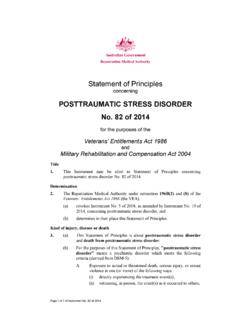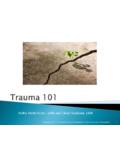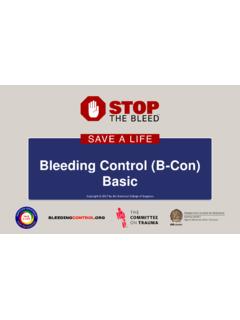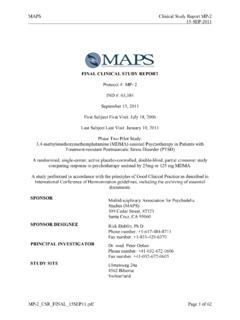Transcription of CRISIS TEAM RESOURCE GUIDE: READINESS, RESPONSE, …
1 1 CRISIS team RESOURCE guide : readiness , response , AND RECOVERY Table of Contents Foreword 3 Introduction 5 Definition of Terms 7 Chapter One: readiness 9 Chapter Two: response 11 Chapter Three: Student Reactions 17 Chapter Four: Cultural Issues 23 Chapter Five: Recovery 33 Chapter Six: Death by Violence 35 Chapter Seven: Suicide 41 Chapter Eight: Care for the Caregivers 43 Resources 47 Table of Contents for Handouts 59 CRISIS response team RESOURCE guide References 173 2 3 CRISIS team RESOURCE guide : readiness , response , AND RECOVERY FOREWORD Maryland School Psychologists Association (MSPA) has provided valuable professional development opportunities to school-based staff for years.
2 The topics range from issues within special education, to mental health, to CRISIS / traumatic loss response . In today s school climate, the physical and mental well being of students and school staff come under siege from a variety of sources. Violence within the schools and surrounding communities co-exists with untimely accidents and losses (via death or serious illnesses/injuries) within school families. School-based professionals within districts across the nation continually search for resources to aid them in responding to the aforementioned emergencies.
3 MSPA recognized this need and as early as 2001, under the leadership of then president Robin Satchell, coordinated with the National Association of School Psychologists (NASP) to provide National Emergency Assistance team (NEAT) training for participants of local school districts in Maryland, Delaware, and the District of Columbia. The response was overwhelming. According to feedback surveys collected after the training, the majority of participants acknowledged the workshops to be thorough, as well as relevant.
4 Months after the completion of the workshops, some of the participants collectively inquired what MSPA could do to provide follow-up training on the topics of CRISIS and traumatic loss response . In 2003, MSPA s President Chandra McKnight-Dean led the Executive Board in moving forward with the CRISIS training project, which morphed into the development of a CRISIS response Committee (an ad-hoc committee). This committee was charged with the initial task of developing a state-wide CRISIS response network that would be available for the local school systems.
5 With this goal in mind, an emergency response needs assessment was distributed to each local district in January 2004. The recipients of these mailings included superintendents, directors of student services, safe schools coordinators, and school psychology coordinators/supervisors. The results of this needs assessment indicated that local school systems preferred a CRISIS RESOURCE rather than a CRISIS response network. It was determined that committee members needed to have a consistent model of training.
6 Toward that goal, Robert Hull, Maryland State Department of Education s School Psychology Representative at the time, facilitated contact with International Critical Incident Stress Foundation, (ICISF). ICISF agreed to provide free initial training to MSPA members selected from various school systems state-wide. With financial backing from the MSPA s executive board, funding was secured for 10 MSPA members to receive additional training from ICISF. The following districts had representation at the trainings: Anne Arundel; Baltimore; Carroll; Charles; Frederick; Howard; Montgomery; Talbot; Washington; and Baltimore City.
7 The majority of those 4 trained formed the current MSPA CRISIS response Committee who initiated and completed this CRISIS team RESOURCE guide : readiness , response , and Recovery. The following individuals developed this guide : Preston R. Bodison, Baltimore County; Claudia R. Bowen, Carroll County; Mary V. Cashdollar, Carroll County; Dana Deise, Baltimore City; Ann C. Hammond, Frederick County; Stephanie E. Livesay, Howard County; Robin M. Satchell, Anne Arundel County; Patricia C. Vaira, Charles County; Paul Wolverton, Washington County; and Steven Wrightson, Talbot County.
8 The committee would like to acknowledge the following: National Association of School Psychologists CRISIS Prevention and Intervention Committee for its collaboration and contributions; local school systems for their CRISIS response materials and the time they allowed the committee members to work on this project; and Mary Schoenfeldt for the use of her materials on Death by Violence. 5 INTRODUCTION The Maryland School Psychologists Association (MSPA) established a committee to examine the needs of, and provide support to, Maryland school psychologists serving as members of local, regional or state CRISIS response teams.
9 This CRISIS team RESOURCE guide was developed in response to these identified needs. It has been organized as a hands-on RESOURCE guide for school psychologists seeking ways to communicate key information and intervention strategies to administrators, teachers, parents, and community members when responding to a CRISIS event. It reflects the continuing commitment of Maryland school psychologists to provide research-based, yet accessible information to those concerned with promoting positive coping behaviors in the aftermath of a CRISIS / traumatic event.
10 The information contained in this guide has been compiled from multiple resources in an attempt to provide best practices in CRISIS readiness , response and recovery. Suggestions for Using This guide Organized in a loose-leaf format, the content and resources in this guide are designed to provide information on the following CRISIS related issues: preparedness, response , student reactions, cultural considerations, recovery, death by violence, and care for the caregiver. References, handouts, and additional resources are an essential part of the guide as well.







